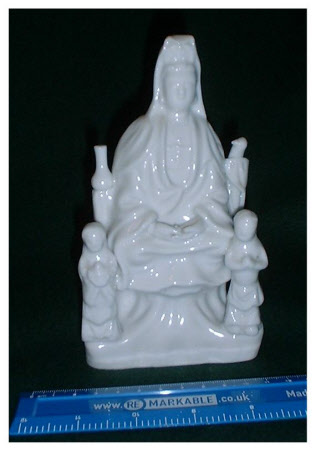Figure
Category
Ceramics
Date
1660 - 1699
Materials
porcelain
Measurements
166 x 92 x 50 mm
Place of origin
Dehua
Order this imageCollection
Wallington, Northumberland
NT 581858
Summary
Figure of Guanyin with acolytes, porcelain, modelled as a seated female-type figure her hands in a variation of the Dhyana and Shuni mudras, raised on a rocky throne above waves with small figures of two acolytes or attendants, Shancai and Longnü, standing at either side, behind them on a narrow ledge is a bottle, containing an elixir of immortality and on the other side is a bird, the goddess is dressed in voluminous robes with a cowl or veil above her crown and she wears a jewelled necklace, made in the Dehua kilns, in Fujian province, China, c. 1660-1699; press-moulded, undecorated and covered with a clear, colourless glaze.
Full description
Guanyin 觀音 is a bodhisattva, a figure in Buddhism who has achieved spiritual enlightenment but who remains in the mortal realm to help others. In Chinese folk belief Guanyin was seen as a goddess of mercy and was thought to be able to ensure the birth of healthy children (McArthur 2002). Although originally made for the Chinese market and intended for religious worship, representations of Buddhist figures in Dehua porcelain were also exported to Europe from the seventeenth century onwards, where they were admired for their material finesse. This type of porcelain is sometimes known in the West as ‘blanc de Chine’ (‘Chinese white’). From the Song dynasty (960–1279) onwards, the deity shows predominantly female characteristics, her image derives from that of the Bodhisattva (enlightened being) Avalokiteévara. The small figure is atypical, as other versions include a small child seated on her lap.
Provenance
Gift from Sir Charles Philips Trevelyan 3rd Bt
